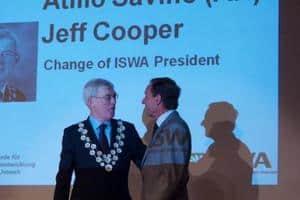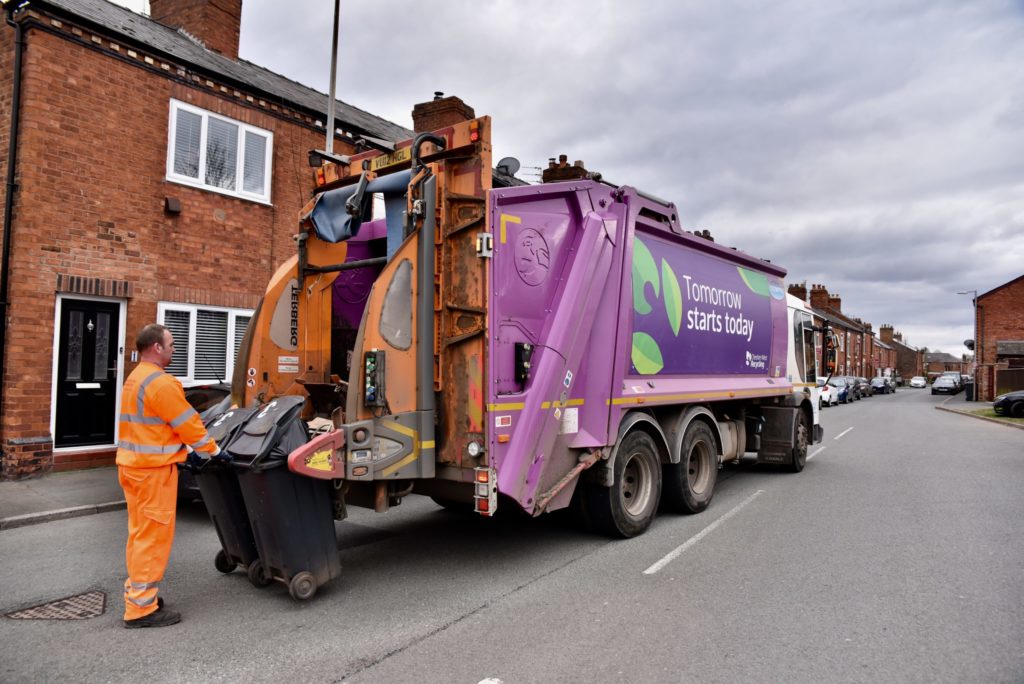Hamburg was the host city for the 2010 International Solid Waste Association's Annual Congress. In her welcome message to participants, Anja Hajuk, Senator for the Department of Urban Development and Environment for the City and State of Hamburg, praised the prescience of the Congress organisers in selecting Hamburg as the venue. This was just a few weeks before Hamburg takes over the mantle of Green Capital of Europe from Stockholm but also making that decision two years before Hamburg's green capital status was decided!
The second issue was waste prevention, not always regarded by many waste managers as a priority, as I readily acknowledged. Indeed within the context of the EU's revised Waste Framework Directive prevention and re-use, providing the item or material has not become waste, remains outside the scope of the definition of waste. Irrespective, waste prevention will become increasingly significant as a focus for policy makers and waste generators as we have progressively moved more waste into recycling and recovery and severely limit use of landfill in the future.
Sustainable Development
Helge Wendenburg from the Federal Ministry for the Environment, Nature Conservation and Nuclear Safety spoke about sustainable development in Germany. He noted that in 1994 Germany had introduced its Closed Substances Cycle and Waste Minimisation Act under which every organisation was required to examine the wastes they generated through the spectrum of the waste hierarchy and to act in conformity with the hierarchy. However, he admitted that they were re-examining this because the Japanese now have a three-stage hierarchy that emphasises reduction and re-use and finishes with recycling.
The opening keynote address on sustainability was presented by Professor Ernst Ulrich von Weizsacker. After a long and distinguished career Prof von Weisacker is now the co-chair of the International Panel for Sustainable Resource Management. After the production of his ground-breaking book Factor 4 published in 1997 he has just published Factor 5, recognising that we need to make up for the opportunities we failed to take up over the past decade.
Prof von Weizsacker suggested that the waste sector would become an even more significant provider of raw materials and energy than it is already but that current methods of recycling and recovery are not very efficient. He noted that more non-ferrous metals could be recovered from IBA (incinerator bottom ash), for example, or even fly-ash. The main problem that we faced and continue to face was that the price of raw materials and energy had failed to keep pace with the rate of increase in labour productivity. Even with the most recent record increases in the price of most commodities, on a long-term trend basis even these prices are still modest.
Sustainable Development Policies
The sustainable development theme was continued in the afternoon session with Karl Falkenberg, the Director General for DG Environment at the European Commission, who was followed by Leopold Zahrer from the Austrian Federal Ministry and Maria Belova, originally from Russia but now working in Germany looking at the CIS countries.
Karl Frankenberg, in reference to von Weizsacker and the Japan 3Rs policy said that there would be a communication issued by the Commission early in the New Year on resource efficiency. He noted that the performance of the EU Member States over the past few years had seen a slow de-coupling of waste generation from GDP growth. This trend he ascribed to three sets of instruments: regulations, economic incentives and producer responsibility and design.
With future regulatory controls, therefore, there will be a higher recovery rate imposed for WEEE through the revised WEEE Directive. With economic incentives, he cited his own household waste situation where in the part of Belgium where he lives he has to purchase plastic bags for his residual waste collection and disposal. Despite its desire to be the greenest government ever for the UK Coalition government this option to reduce household waste generation now appears to be lost forever.
With producer responsibility and design there was still the problem that packaging products were still designed to be most attractive for consumers rather than ensuring resource efficiency. He also made the point that there needed to be greater consumer awareness so that products with less environmental burden associated with them would have greater consumer demand. Sadly, he noted that consumers were “catholic”, sinning during the week and repenting on Sunday.
Karl Frankenberg highlighted that in the last quarter Germany was celebrating the fact that energy consumption had increased by 4% and therefore the economy was back on track but there had been a rise in GDP of only 3.7%. Was this a successful outcome from the recession? He also suggested that price signals were not necessarily the most important aspect of decision making with respect to waste management globally. Thus there was an incentive to send (near) ELVs, for example, down to Africa.
Leopold Zahrer dealt with sustainable development in the Federal Republic of Austria, noting that the country's approach was obviously guided by and in accordance with the EU's strategy. With waste management there had been two strategies: in 1990 and 2002 and a third Federal Plan for Waste Management would be published in 2011. He showed his department's green credentials in that the Ministry of Environment had itself been the first European Ministry to be certified under EMAS.
Other key points regarding the waste portfolio were that MBT plants were being closed down due to higher emissions standards. Also that Austria still had some landfill of reactive waste despite a high landfill tax, partly due to this option being allowed under the EU's Landfill Directive but mainly because a few Austrian provinces had been slow to establish alternative options for the treatment of residual waste. However, he was confident that when the statistics had been finally collated that in 2009 Austria would have sent zero waste to landfill compared to 3.7% in 2008.
Maria Belova was born and educated in St Petersburg but now works for the German consultancy company Fichtner. Her presentation dealt with the issues associated with the transition from a planned economy to a capitalist system, using the example of the CIS (Commonwealth of Independent States), those parts of the former USSR that decided to stay linked with Russia rather than opting out for complete independence, such as the Baltic States.
Her story is familiar to those who have worked in the Eastern Bloc countries after the fall of the Berlin Wall with a lack of finance, residents unable or unwilling to pay for waste services, inter alia, and therefore the services being progressively downgraded and the infrastructure declining in standards. For the future she suggested that there are two possible financial mechanisms that can be utilised to improve waste management standards: PPP (public/private partnerships) and the Kyoto Protocol's CDM (clean development mechanism) which is likely to be used mainly for the improvement of landfills.
WEEE
One of the final parallel sessions focused on e-waste with the opening presentation coming from Lakshmi Raghupathy, a former Indian federal waste policy and regulation official. With the support of a number of German institutes and charities she was now setting up WEEE treatment facilities to improve the conditions of informal sector workers.
While efforts are being made through tightening the policy and regulatory framework in that India has introduced E-waste (Management and Handling) Rules 2010 under existing legislation these are currently only in draft. More significant are the efforts to combine the strengths of the informal sector with the superior processing technology of the formal sector.
The marriage of the informal sector and the formal sector is being arranged so that the processes which are best undertaken by the informal sector are retained but they are provided with better quality working environment through the buildings and tools supplied by the formal sector. Therefore the informal sector will retain responsibility for the initial segregation and collection of the WEEE, which often means paying the generator of the WEEE a few rupees for taking it away. In addition, the initial disassembly will by performed by informal sector workers because that is more beneficial than the use of mechanical shredding systems typically used in developed countries.
The first task is setting up an association for co-operatives to provide an official structure through which the informal sector workers can interface with the formal sector. Pilot activities following these principles have been established in Bangalore and Delhi, 2 in each, and a further 2 will be set up in both Kolkata and Pune during 2011.
Ralf Bruening also tackled an important aspect of WEEE handling for the developed economies, such as the EU MSs, so that in future there is a greater possibility of having WEEE delivered to municipal facilities capable of being re-used. This will be through establishing a standard, VDI 2343 which will set guidelines so that for Group 3 equipment – VDUs, CRTs and other display equipment – so that they could be stored to be capable of re-use, either whole or through the utilisation of components.
The work so far has meant the distinction between re-use I – re-use of products- and re-use II – re-use of waste items, which will be an important distinction for the revision of the WEEE Directive and will also reinforce the definitions of the revised Waste Framework Directive. A further piece of work is being undertaken through CEN, the European Standards body, EN 62309, which is a standard for products containing re-used components. Again, this will be important if we are to maximise the resource value of our WEEE.
The third presenter, Horst Broehl-Kerner was also from Germany and dealt with the work of RREUSE, the European network in 14 countries that utilise WEEE, and often a range of other goods and materials for social and sustainability objectives.
Discussion naturally focussed on the global aims and objectives of curbing WEEE or near WEEE exports and the need for tighter controls. There was considerable discussion about export of potentially repairable WEEE, which might have some advantages for employment and training development in the receiving countries. Nevertheless, overall the Congress participants preferred to avoid the export of non-functioning EEE and also to establish treatment and processing facilities in the countries of export.
There were two awards presented during the Congress: for the best waste related communications campaign and the publication award. These awards were presented in Hamburg's huge and splendid Town Hall at a reception hosted by the Senate and sponsored by Mercedes Benz.
ISWA 2010 Publication Award winner
Within the past year it is estimated that more than 50% of the World's population for the first time now live in urban areas for the first time. Therefore Solid Waste Management in the World's Cities is a timely and welcome publication. The report was commissioned and sponsored by the United Nations Human Settlements Programme (UN-Habitat).
The report was produced by a large number of gifted and expert authors co-ordinated by the three principal authors and editors: Anne Scheinberg, David C Wilson and Ljiljna Rodic-Wiersma. However, it is the large number of contributing writers, many drawn from the collaborative working group on solid waste management in middle and low income countries (CWG) who have had the opportunity to illustrate best practice in many different social, environmental, and technological contexts. In addition, there were a large number of people involved with the production and checking of data, presentation and layout and provide us with such clear expositions of the critical role of waste management in maintaining a sound environment for cities.
The publication benefits from both a wide spectrum of approaches to the assessment and management of waste and its recovery potential in developing, transition and developed countries. These varying approaches are exemplified through 20 city case studies. The primary concern for waste managers is the health and safety of the city's residents and for all handling or exposed to that waste or its potential mis-management. Increasingly managing our urban waste resources and the sustainability of those decisions is becoming a stronger influence whenever we consider our role in tackling these issues, especially in the mitigation of climate change impacts.
I commend this publication as essential reading for waste managers and all those concerned about resource management and the recovery of waste for further productive use.
Vienna's Poop Scoop Success in ISWA Communication Award
Vienna in common with other communities around the World had a problem with dogs fouling public streets, parks and other areas. Several previous attempts had failed but in 2006 a mother of two toddlers secured 160,000 signatures on a petition. Thereafter the City's waste management authorities introduced a comprehensive and progressive information, education and enforcement effort to persuade dog owners to “pack my poop in a sack”. The sacks were provided by the city and extra doggie bins added in addition to the extra staff employed to impose on the spot fines and other sanctions.
The judges were impressed by the overall communications plan and in particular:
• The communication with existing staff
• The hiring of new staff
• The use of amusing but thought provoking signs placed in public parks
• Thorough assessment throughout its roll-out
• Extensive evaluation of the results.
This evaluation included analysis of the contents of a weeks worth of doggie bags to determine the doggie contribution to Vienna's waste management system. For the statistically minded at least 3 tonnes of dog faeces are collected each day.
The best result is the fact that 87% of people are now satisfied that Vienna has adequately addressed the dog waste problem.
In her acceptance speech Martina Ableidinger, Chief Operating Officer for M48, noted that the heaviest fine imposed on a dog owner for failing persistently to clear up after their dog was €1,400,
Second – Sweden's Waste Managers get Frank about Waste
Sweden national waste management body Avfall Sverige has more than 400 members, mainly municipalities but also the waste management and recycling companies. In 2008 they embarked on Sweden's largest environmental movement, an internal promotion programme to galvanise the 16,000 workers for each of Avfall Sverige's members to promote three key components of Sweden's waste strategy:
• Material recovery
• Hazardous waste, and
• Energy recovery.
This required a multi-media approach to ensuring the message was accessible to as many of Sweden's citizens as possible.
Third – Waste No More
The Netherlands provided our third winner with the Van Gansewinkel Groep's inspiring initiative to Waste No More reflecting our aspirations to move from traditional waste management services towards being a supplier of raw materials and energy for businesses and the community. Their communications programme was very comprehensive, including most of the communication media. Significantly they started by providing their employees with a home-based set of information, including CDs and games to interest family members. In contrast to the other winners it was felt by the panel that it was felt from the information provided that it was probably too early to determine the full effects of the campaign.
Viele Dank, Hamburg
The ISWA Congress was widely regarded as a very successful Congress, both during the Congress itself and for the 7 study tours, which included not only the incinerator plants and the Hamburg re-use and recycling facilities but also the Airbus Industries' facility, where much of the giant A380 is manufactured, “the World's greenest aircraft”.
Next year the ISWA Congress venue is Daegu, Korea from 17-21 October 2011 within an area with excellent tourist venues. Korea has also opted to respond to the global economic crisis not by throwing money at the financial sector by investing wholesale in greening its economic structure.













Subscribe for free